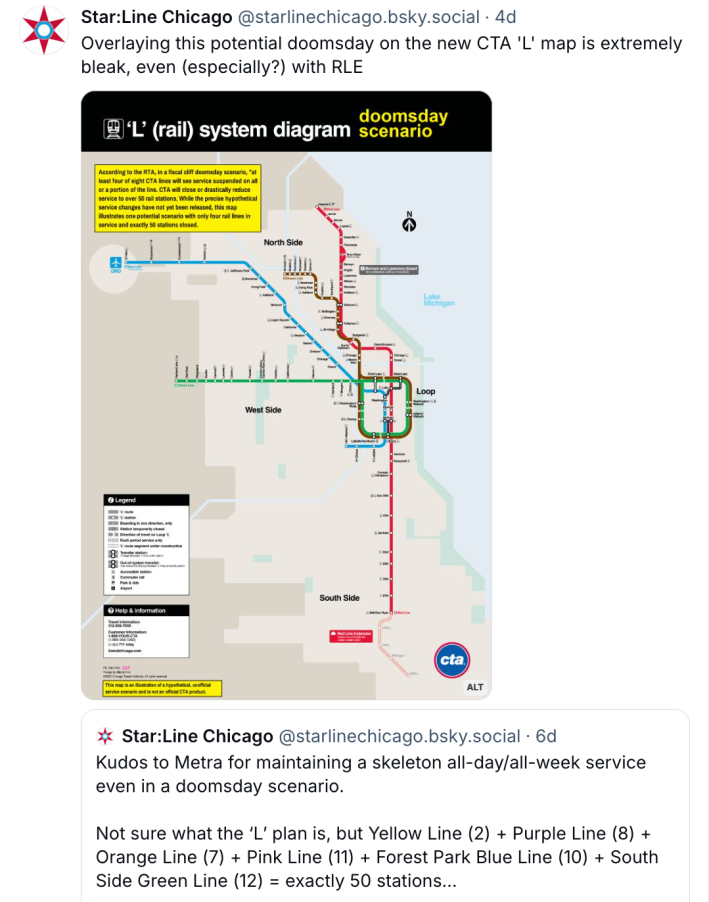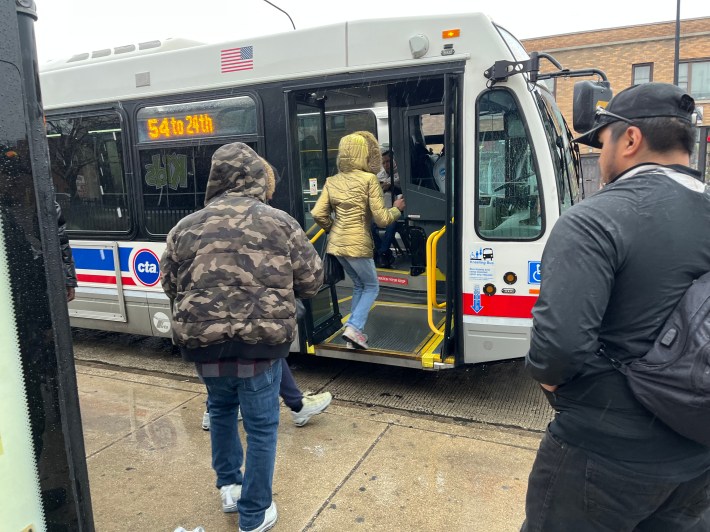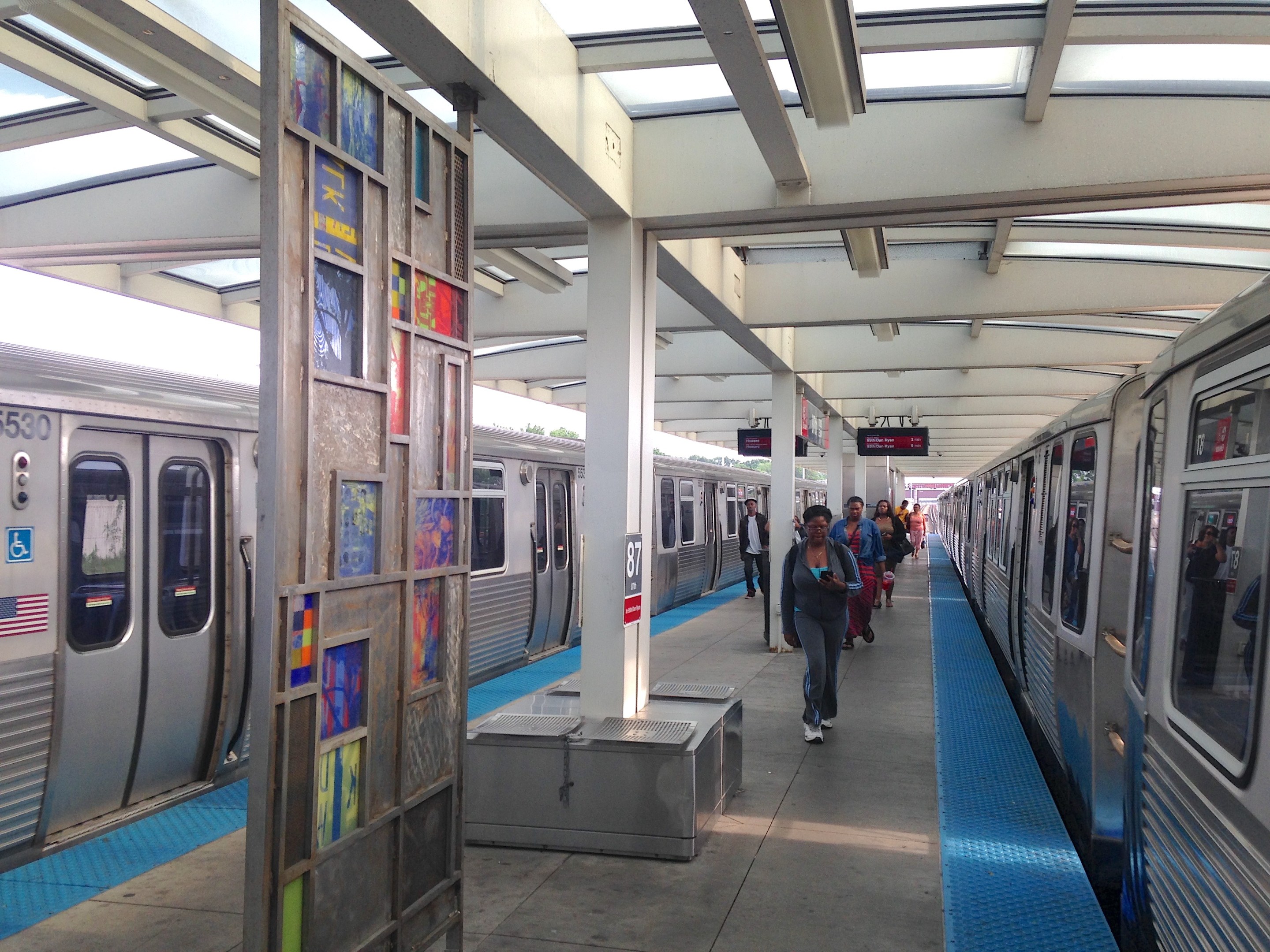
As regular Streetsblog Chicago readers are well aware, right now the future of public transportation in our region is not looking bright.
Right now, the CTA, Metra, and Pace need funding to address a projected $771 million total budget gap in 2026, caused by ridership that still hasn't fully recovered since COVID-19, and dwindling federal pandemic stimulus funds. According to the Regional Transportation Authority, without action on sustainable funding from the state, in future years there will be similar deficits of about 20 percent of the current operating budget, adjusted for inflation.
But the agencies, transit advocates, and the Chicago Metropolitan Agency for Planning would like to see the state instead allocate $1.5 billion a year, adjusted for inflation each year. That would address the budget shortage, "and then provide funding beyond the gap to support expansion and increased frequency over current service levels," according to an RTA spokesperson
Unfortunately, neither of those scenarios materialized before the end of Illinois General Assembly's spring legislative session on May 31 around midnight. The Senate passed a transit funding and governance reform bill that night. But the House didn't even vote on the legislation, with representatives voicing concerns about funding sources that were proposed at the eleventh hour, including a new $1.50 tax on deliveries.
The hope is that lawmakers will reach a transit funding agreement during an emergency summer legislative hearing. But at a somber RTA board meeting last Thursday, the agencies were asked to plan for a doomsday situation in case the money doesn't materialize, which could mean 40 percent service cuts and 3,000 layoffs.
Streetsblog recently reached out to sustainable transportation advocacy organizations focused on the South and West sides to get their take on the what the indecision in Springfield could mean for already-underserved parts of town.
The Southwest Collective

The Southwest Collective calls itself "a collective of neighborhoods in the Midway [Airport] area, joining forces to improve the Southwest Side of Chicago." That includes efforts to make streets safer and more efficient for all transportation modes.
The organization's Transit Advocacy Steward Dixon Galvez-Searle noted that the CTA has recently been working on projects to improve transit service, such as the new Frequent Network for Buses program, with ten-minute headways. "But all of that obviously requires funding," he said. "So if we're talking about systemwide cuts, if nothing happens, that's what we're looking at. Then [the Southwest Side], which already doesn't have great reliability for bus service and just has the [Orange Line] and not a whole lot of Metra coverage, service cuts are going to an area like ours even harder."
"I saw a map on social media where somebody sort of extrapolated what severe service cuts might look like," he added, referring to an image posted by the local sustainable transportation advocacy account Star:Line Chicago. "The Orange Line had entirely disappeared."

"I don't imagine there will be a scenario where the Orange Line entirely disappears," Galvez-Searle said. "But even under a very-bad-case scenario where a few Orange Line stations were taken out of commission, there are not a lot of Orange stations. Obviously, you keep Midway. But even if you cut down half of the Orange Line stations, that's a very severe impact on on people who use that to get downtown and get around the city."
"So, yeah, we don't have a lot of capacity to spare when it comes to service cuts, so that's definitely something we'd like to avoid," he concluded. "And then move on to the conversations about investment that are the conversations that we should really be having." He pointed to last year's proposal from alderpersons along Western Avenue to bring bus rapid transit to that corridor, and other ideas for fast bus service on major streets like Pulaski Road. "If the CTA goes over the fiscal cliff, then all those nice-to-have projects would go by the wayside."

Equiticity
Equiticity is a local mobility justice nonprofit that focuses on issues affecting communities of color. José Manuel Almanza is the group's Director of Advocacy & Movement Building.

"The collapse of the transit rescue plan is devastating, especially for Black and Brown communities who rely most on CTA service," Almanza said in a statement. "This isn’t just a budget issue. It’s a racial and economic justice issue. Cuts to transit service or fare hikes would punish the very riders who kept the system running during the pandemic. Every missed bus, every longer wait time, every dollar increase in fare is a form of time theft and economic punishment targeting working-class communities."
"This failure reflects a lack of political will, not a lack of options," Almanza added. "Lawmakers had a chance to fund transit through progressive mechanisms like taxing downtown parking, congestion pricing, and corporate contributions, and they chose austerity instead."
"Earlier this month I helped organize a Better Streets for Buses town hall in McKinley Park with Neighbors 4 Environmental Justice," Almanza said. "Residents were energized, hopeful, and ready to imagine what was possible: faster, more reliable buses; safe streets; and an accessible system that meets our needs. But now, that vision feels crushed. Springfield’s inaction sends a clear message: The futures Black and Brown riders are fighting for are not a priority.

"Disinvestment in transit is not neutral, it deepens inequality, accelerates displacement, and reinforces transportation apartheid," Almanza concluded. "We need bold action, not just to plug budget holes, but to reimagine public transit as a fully funded, fare-free public good, co-governed by the communities who rely on it the most."

Did you appreciate this post? Streetsblog Chicago is currently fundraising to help cover our 2025-26 budget. If you appreciate our reporting and advocacy on local sustainable transportation issues, please consider making a tax-deductible donation here. Thank you!





